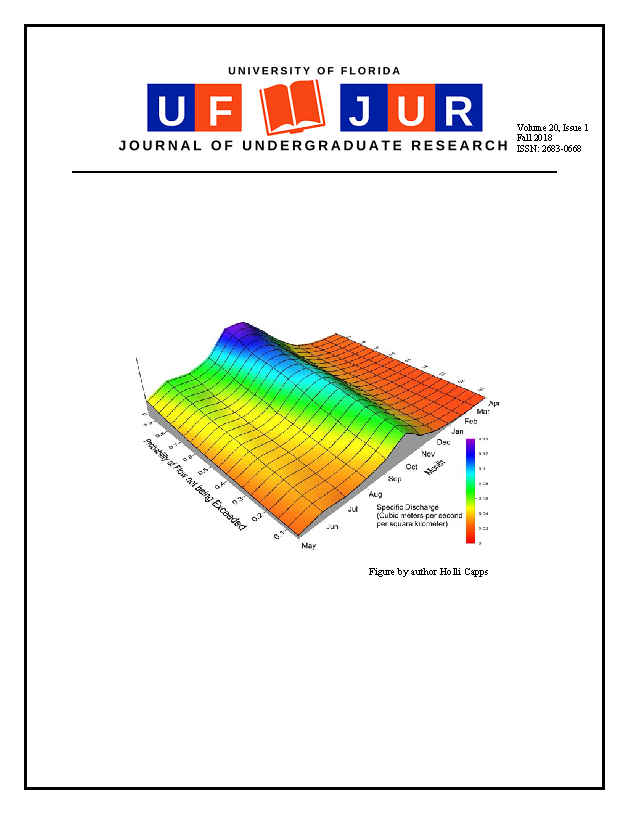Effect of Prenatal Lactation Education on Lactation Success in Mothers at Risk of Preterm Delivery
DOI:
https://doi.org/10.32473/ufjur.v20i1.106538Keywords:
undergraduate research, preterm, prenatal, premature, breast milk, infant, lactation, neonatal, neonatologyAbstract
Background:Mothers of preterm infants often produce insufficient amounts of breast milk (BM). Early initiation of BM expression following delivery is associated with increased lactation success, but lack of nursing time delays BM expression in this population.
Purpose:To determine if providing antenatal breast expression education to the support person (SP) of mothers at risk of preterm delivery improves lactation success.
Methods: Twenty women at risk for delivering a preterm infant and their SP were randomized into two groups. Mothers and their SP in Group 1 received education regarding how to use a breast pump and a breast pump was placed into their hospital room. Group 2 received standard care. Data regarding BM volume produced, time to initiation of BM expression and time to onset of lactogenesis stage II was collected.
Results: While there was no difference in time to onset of lactogenesis stage II, mothers in Group 1 initiated BM expression 2.5 hours earlier than those in Group 2. Overall, BM production was higher in Group 1.
Limitations: This study had a relatively small sample size (n=19). Only mothers delivering 31-33 weeks gestation were included. This is a single-center study, which may limit generalizability.
Conclusion: Prenatal lactation education of mothers of preterm infants and their SP is feasible and may increase lactation success.
Metrics
References
Callaghan, W. M., MacDorman, M. F., Rasmussen, S. A., Qin, C., & Lackritz, E. M. (2006). The contribution of preterm birth to infant mortality rates in the United States. Pediatrics, 118(4), 1566-1573. http://dx.doi.org/10.1542/peds.2006-0860
Callen, J., & Pinelli, J. (2005). A review of the literature examining the benefits and challenges, incidence and duration, and barriers to breastfeeding in preterm infants. Advanced Neonatal Care, 5(2), 72-88.
Henderson, G., McGuire, W., & Antony, M. (2007). Formula milk versus maternal breast milk for feeding preterm or low birth weight infants. Cochrane Neonatal Review.
Ikonen, R., Paavilainen, E., & Kaunonen, M. (2016). Trying to live with pumping: Expressing milk for preterm or small for gestational age infants. The American Journal of Maternal Child Nursing, 41(2), 110-115. http://dx.doi.org/10.1097/NMC.0000000000000214
Institute of Medicine (US) Committee on Understanding Premature Birth and Assuring Healthy Outcomes. (2007). Preterm birth: Causes, consequences, and prevention (R. E. Behrman & A. S. Butler, Eds.). http://dx.doi.org/10.17226/11622
Meinzen-Derr, J., Poindexter, B., Wrange, L., Morrow, A. L., Stoll, B., & Donovan, E. F. (2009). Role of human milk in extremely low birth weight infants’ risk of necrotizing enterocolitis or death. Journal of Perinatology, 29, 57-62. http://dx.doi.org/doi:10.1038/jp.2008.117
Parish, A., & Bhatia, J. (2008). Feeding strategies in the ELBW infant. Journal of Perinatology, 28, 18-20. http://dx.doi.org/doi:10.1038/jp.2008.45
Parker, L., Sullivan, S., Krueger, C., Kelechi, T., & Mueller, M. (2012). Effect of early breast milk expression on milk volume and timing of lactogenesis stage II among mothers of very low birth weight infants: A pilot study. Journal of Perinatology, 32, 205-209. http://doi:10.1038/jp.2011.78
Parker, L., Sullivan, Hoffman, J., & Darcy-Mahoney, A. (2018). Facilitating Early Breast Milk Expression in Mothers of Very Low Birth Weight Infants. The American Journal of Maternal/Child Nursing, 43(2) 105-110. http://doi:10.1097/NMC.0000000000000408
Sisk, P. M., Lovelady, C. A., Dillard, R. G., Gruber, K. J., & O'Shea, T. M. (2007). Early human milk feeding is associated with a lower risk of necrotizing enterocolitis in very low birth weight infants. Journal of Perinatology, 27, 428-433. http://dx.doi.org/10.1038/sj.jp.7211758
Vohr, B. R., Poindexter, B. B., Dusick, A. M., McKinley, L. T., Higgins, R. D., Langer, J. C., & Poole, W. K. (2007). Persistent beneficial effects of breast milk ingested in the neonatal intensive care unit on outcomes of extremely low birth weight infants at 30 months of age. Pediatrics, 120(4), 953-959. http://dx.doi.org/10.1542/peds.2006-3227
World Health Organization. (2017, November). Preterm birth. Retrieved March 7, 2018, from World Health Organization website: http://www.who.int/mediacentre/factsheets/fs363/en/
Downloads
Published
Issue
Section
License
Some journals stipulate that submitted articles cannot be under consideration for publication or published in another journal. The student-author and mentor have the option of determining which journal the paper will be submitted to first. UF JUR accepts papers that have been published in other journals or might be published in the future. It is the responsibility of the student-author and mentor to determine whether another journal will accept a paper that has been published in UF JUR.

